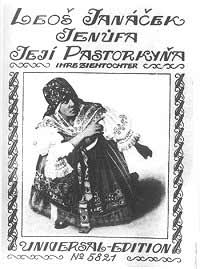Herkomst
van
de naam Jenufa
Het
Jenufa Kwartet is genoemd
naar de gelijknamige opera van de
Tsjechische componist Leoš Janáček.
Het
Jenufa Kwartet bezocht deze opera
tijdens een studieperiode in Praag,
waar zij op dat moment werkten aan
een strijkkwartet van Leoš Janáček.
Synopsis

ACT
I.
In a quiet Moravian village, Jenufa waits anxiously to hear if her beloved
Števa is to be drafted, for she is carrying his child. Števa's
stepbrother, Laca, secretly loves Jenufa but tries to hide his feelings
by making offensive comments about her to his grandmother - who owns the
nearby mill - and to the mill's Foreman. The
shepherd boy Jano enters, thrilled that he can read and thanking Jenufa
for teaching him. It soon turns out that Števa is free of military
duty, and he staggers in with some boisterous recruits, musicians and
villagers, who break into a rowdy dance. Jenufa is distraught over Števa's
cavalier attitude. The noise incurs the displeasure of Jenufa's foster
mother, Kostelnicka. She is a stern widow with considerable moral authority,
whose name describes her honorary office with the church where she serves
as a sacristan. Remembering her own drunken husband, she tells Števa
he can marry Jenufa only after a year of teetotaling. Grandmother Buryja
sends everybody away, leaving Števa alone with Jenufa. He is petulant
at her plea for marriage. After he leaves, Laca returns, needling Jenufa,
finally quarreling with her. Torn between love and jealousy, he slashes
her cheek with his whittling knife. She runs into the house, and the servant
Barena says it was an accident, but the Foreman accuses Laca of hurting
Jenufa deliberately.
ACT
II.
While everyone thinks she is in Vienna working as a servant, Jenufa has
remained hidden at home and given birth to a boy. Her proud stepmother
cannot bear the shame and has sent secretly for Števa. After giving
the girl sleeping medicine, she tells him about the baby and kneels before
him, begging him to wed Jenufa and claim his son. But he refuses to take
a disfigured bride; in fact he is engaged to Karolka, the Mayor's daughter.
Next Jenufa's distraught stepmother turns to Laca, who is eager to marry
the girl but so taken aback to hear about her baby that Kostelnicka on
an impulse pretends it is dead. There is only one way out for her now,
she feels. Taking the child, she heads for the frozen millstream to drown
him. When Jenufa wakes, she prays for her child, but her stepmother returns
to tell the girl she has been in a coma for two days, during which the
baby died. She also tells her about Števa's coming marriage. Laca
returns, humbly offering himself to Jenufa, who reminds him she has neither
wealth nor honor. Laca insists he loves her. Conquered by grief, she agrees
to become his wife.
ACT III. Two
months later, Jenufa is about to marry Laca. Among the guests are the
Mayor and his Wife - who notices that Jenufa is not wearing the usual
white garland - and Števa with his coquettish fiancée, Karolka.
Barena and some other girls arrive with flowers, and Grandmother Buryja
blesses the couple. Suddenly, Jano runs in to say a drowned baby has been
found in the thawing millstream. Kostelnicka becomes hysterical, while
Jenufa identifies the body as that of her child. Everyone now turns on
Jenufa, but Laca defends her, and her stepmother's confession abruptly
ends the mystery. Before Kostelnicka is led away to face her punishment,
Jenufa forgives the wretched woman. Then she turns to Laca and offers
him his freedom. Again he declares his love, and since she has grown to
love him too, they put the tragedy behind them and start a new life.